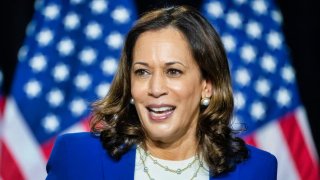A Pragmatic Shift? What Kamala Harris Might Do on North Korea
Despite her differing political views from Trump, Harris's will to resolve North Korea's nuclear issue remains uncertain. She might continue a policy of strategic patience while focusing more on conflicts in Ukraine and the Middle East.
In her acceptance speech as the Democratic presidential candidate, Kamala Harris strongly opposed authoritarian leaders, specifically stating she would not "cozy up" to dictators like North Korea's Kim Jong Un. She criticized Donald Trump for his willingness to engage with such leaders and emphasized her commitment to U.S. democratic values and global leadership.
Despite her differing political views from Trump, Harris's will to resolve North Korea's nuclear issue remains uncertain. She might continue a policy of strategic patience while focusing more on conflicts in Ukraine and the Middle East. However, North Korea's advancing nuclear missile technology, potentially accelerated by Russia, poses a growing threat to the U.S., and the risk of nuclear proliferation in Northeast Asia is increasing. Given this situation, Harris may soon be compelled to address these threats directly, beyond merely increasing deterrence with allies. The question remains whether Harris will consider a more proactive approach, balancing deterrence with diplomacy to manage the growing nuclear risks in the region.
Pyongyang’s Opening up
North Korea has recently shown tentative signs of re-engaging with the international community beyond its close ties with China and Russia, following four years of isolation due to COVID-19. Its participation in the 2024 Paris Olympic Games marked a return to the global stage, along with inviting European and American professors to teach at Pyongyang University of Science and Technology. Additionally, Swedish diplomats are expected to return to Pyongyang soon to resume their work.
These gestures suggest that North Korea might be ready to reopen its doors to the West and potentially recalibrate its foreign policy toward the United States after the upcoming U.S. presidential election. However, North Korea's willingness to engage will depend on whether a new U.S. administration can offer a pragmatic approach that addresses its security concerns and economic incentives.
A Multilateral Arms Control Measures
A Harris administration would likely prioritize denuclearization as the primary U.S. policy toward North Korea while pursuing talks without preconditions, following the Biden administration's approach. However, Harris may recognize that achieving full denuclearization shortly is increasingly unrealistic.
Throughout her time as vice president, she has demonstrated a focus on balancing U.S. interests with a commitment to diplomatic solutions and multilateral cooperation. Known for her pragmatic approach, she might initially focus on small and incremental steps, such as arms control and non-proliferation, rather than aiming for grand bargains that are unlikely to be fulfilled under the current geopolitical situation. This shift could provide a more practical framework, emphasizing broader regional security over immediate denuclearization, which North Korea might find more acceptable.
Additionally, Harris might move away from Trump's high-level bilateral summits with Kim Jong-un, opting for a working-level and multilateral approach.
If this aligns with her practical approach, multilateral nuclear arms control measures could effectively curb the regional arms race, prevent further nuclear development by North Korea, and control nuclear proliferation in the region by reducing regional capabilities and assets.
Addressing Seoul’s Security Concerns
With North Korea's advancing nuclear capabilities, doubts about the U.S. extended deterrence have grown in Seoul. A key challenge for a Harris administration would be convincing South Korea to support a shift toward a multilateral arms control framework, which might be seen as weakening their security guarantees.
To address these concerns, the U.S. would need to show that multilateral arms control could enhance South Korea's security by reducing the nuclear threat from North Korea while maintaining a strong deterrence posture. Furthermore, this approach would not signal abandoning denuclearization but would serve as an initial step for long-term denuclearization on the Korean Peninsula.
In any case, Harris would need to assure South Korea of the U.S.'s continued defense commitment, emphasizing that these efforts strengthen their security. Balancing multilateral diplomacy with a credible deterrence strategy would be essential to reassuring allies like South Korea and Japan while addressing regional nuclear issues.
About the Author
Sangsoo Lee is an associated fellow at the European Center for North Korea Studies at the University of Vienna and a founder of Strategic Linkages (SL), consulting on Korean issues, based in Stockholm. Dr. Lee was the Deputy Director and head of the Stockholm Korea Center at the Institute for Security & Development Policy (ISDP). His areas of interest are Security and Conflict issues in Northeast Asia with a focus on the North Korean nuclear crisis and inter-Korean relations. Dr. Lee holds a PhD in Northeast Asian Studies from Peking University and has been a Visiting Researcher at the United Nations University (UNU-CRIS) (2007) and at the London School of Economics (LSE) (2011).
Image Credit: Creative Commons and/or Shutterstock.


